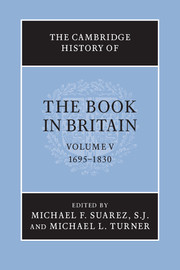Book contents
- Frontmatter
- Introduction
- PART I THE QUANTITY AND NATURE OF PRINTED MATTER
- PART II ECONOMIC, LEGAL AND CULTURAL CONTEXTS
- PART III THE TECHNOLOGIES AND AESTHETICS OF BOOK PRODUCTION
- PART IV THE BOOK TRADE AND ITS MARKETS
- I LONDON AND THE ‘COUNTRY’
- II TWO CASE STUDIES
- III SERIAL PUBLICATION AND THE TRADE
- IV THE INTERNATIONAL MARKET
- 26 Continental imports to Britain, 1695–1740
- 27 The English book on the Continent
- 28 The British book in North America
- 29 The British book in India
- V BOOKS AND THEIR READERS
- Abbreviations used in bibliography
- Bibliography
- Index
- Frontispiece
- Plate section
28 - The British book in North America
from IV - THE INTERNATIONAL MARKET
Published online by Cambridge University Press: 28 September 2010
- Frontmatter
- Introduction
- PART I THE QUANTITY AND NATURE OF PRINTED MATTER
- PART II ECONOMIC, LEGAL AND CULTURAL CONTEXTS
- PART III THE TECHNOLOGIES AND AESTHETICS OF BOOK PRODUCTION
- PART IV THE BOOK TRADE AND ITS MARKETS
- I LONDON AND THE ‘COUNTRY’
- II TWO CASE STUDIES
- III SERIAL PUBLICATION AND THE TRADE
- IV THE INTERNATIONAL MARKET
- 26 Continental imports to Britain, 1695–1740
- 27 The English book on the Continent
- 28 The British book in North America
- 29 The British book in India
- V BOOKS AND THEIR READERS
- Abbreviations used in bibliography
- Bibliography
- Index
- Frontispiece
- Plate section
Summary
The colonial period
Throughout the colonial period, most books read in America were British, as was to be expected in a mercantilist colonial system; however, in the first half of the eighteenth century, the London book trade paid little attention to the colonies. In the second half of the century the book trade awoke to the potential of the American market, just as it was slipping away.
In his Autobiography Benjamin Franklin recalled that
At the time I establish’d myself in Pennsylvania [i.e. in the 1720s], there was not a good Bookseller’s Shop in any of the Colonies to the Southward of Boston. In New York and Philadelphia the Printers were indeed Stationers, they sold only Paper, etc., Almanacs, Ballads, and a few common School Books. Those who lov’d Reading were oblig’d to send for their Books from England.
This passage highlights all the important features of American book culture at the beginning of the eighteenth century. First, nearly all the books in the colonies were British, and apart from the staples – Franklin could have added Bibles, Testaments, and psalters to the list – most books were either brought in by immigrants or ordered from London by their readers. Very few gentlemen dealt directly with London booksellers, however; instead they used agents with whom they had personal acquaintance and credit, and who often had to act through other agents to locate, pay for and ship the desired books. Colonials without an agent in London had to find someone better connected at home who was willing to vouch for them.
- Type
- Chapter
- Information
- The Cambridge History of the Book in Britain , pp. 544 - 559Publisher: Cambridge University PressPrint publication year: 2009
- 1
- Cited by

